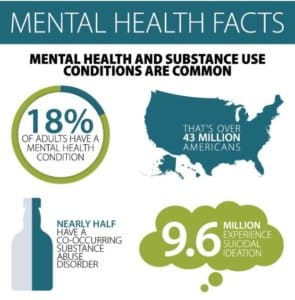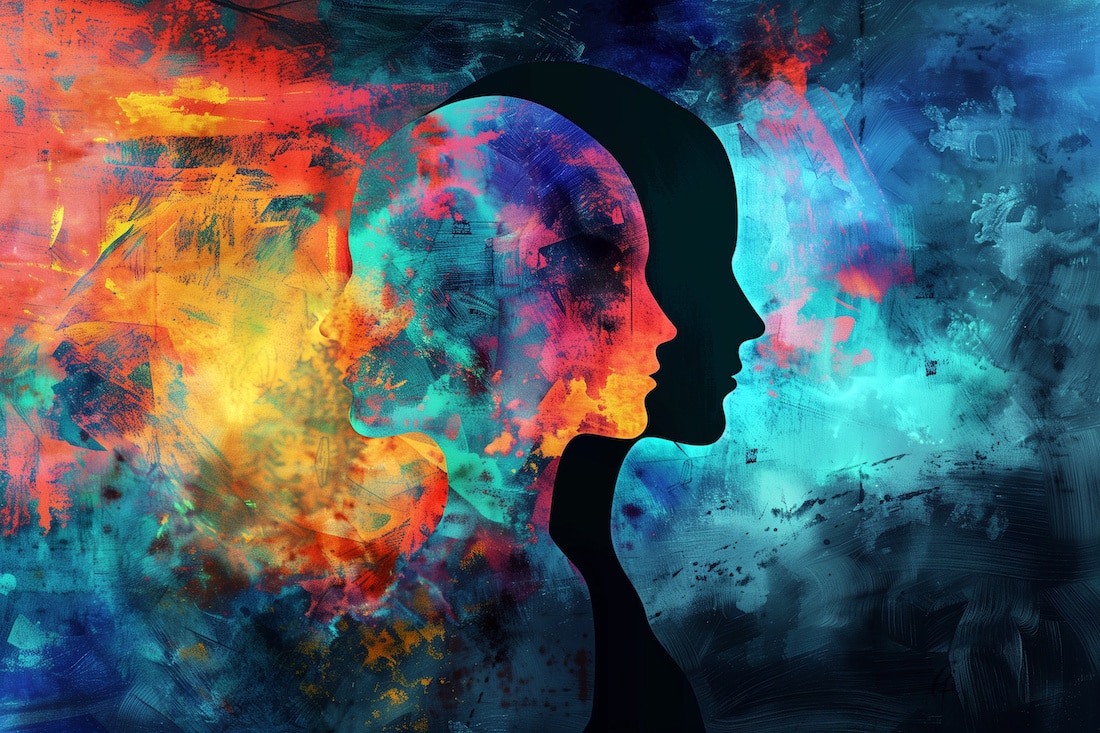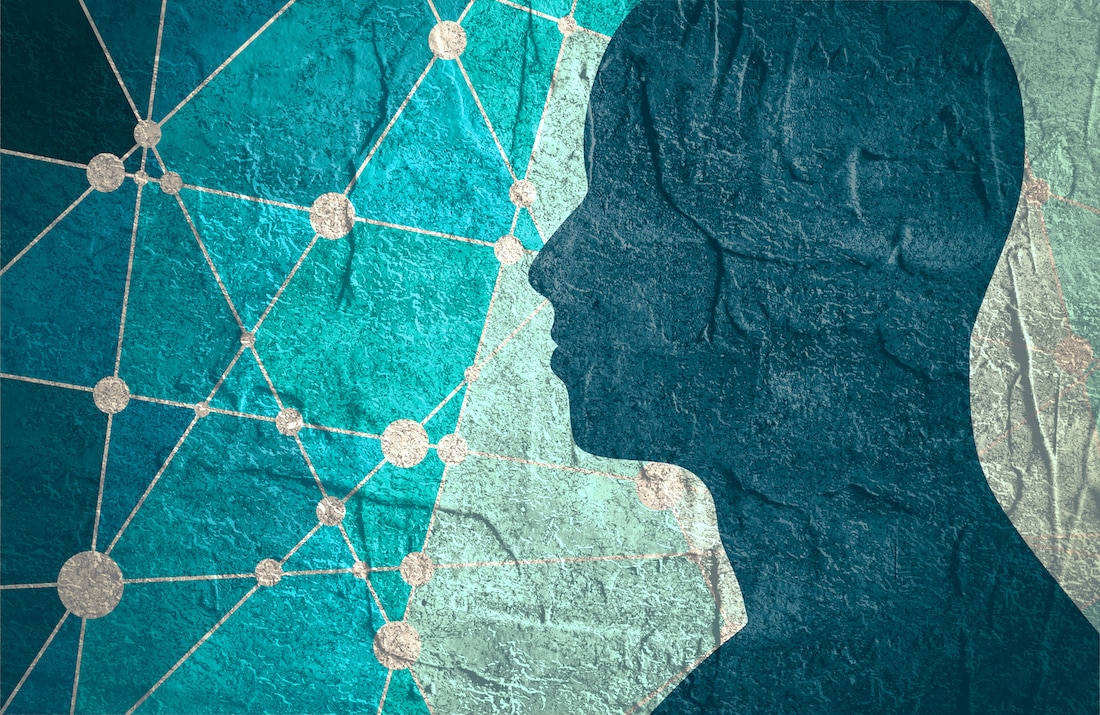 A recent report released by Mental Health America states that 1 in 5 adults suffer from a mental health condition – that is over 40 million Americans. Nearly half of this number are also suffering from co-occurring substance abuse. The mental health of our youth continues to worsen as well, with severe depression increasing from 5.9% in 2012 to 8.2% in 2015. Despite the growing numbers, 56% of Americans who have a mental illness do not receive treatment. The need for treatment programs has never been greater, but assessing which ones offer quality, ethical services to help people recover can be challenging. How do you find the right one? Here are five important things to look for when evaluating treatment facilities.
A recent report released by Mental Health America states that 1 in 5 adults suffer from a mental health condition – that is over 40 million Americans. Nearly half of this number are also suffering from co-occurring substance abuse. The mental health of our youth continues to worsen as well, with severe depression increasing from 5.9% in 2012 to 8.2% in 2015. Despite the growing numbers, 56% of Americans who have a mental illness do not receive treatment. The need for treatment programs has never been greater, but assessing which ones offer quality, ethical services to help people recover can be challenging. How do you find the right one? Here are five important things to look for when evaluating treatment facilities.
Accreditation and State License
Accreditation and licensures are a vital part of quality treatment. Regulatory organizations such as the Joint Commission on Accreditation of Healthcare Organizations (JCAHO), the Commission on Accreditation of Rehabilitation Facilities (CARF), and the Council on Accreditation (COA) require that programs offering minimum levels of evidence-based care must comply with random audits of its clinical care.
Lifeskills South Florida is licensed by the Florida Association of Recovery Residences (FARR), Florida Department of Children & Families (DCF), Florida Agency for Health Care Administration (ACHA) and is CARF accredited. Our long-term residential treatment facility is dually licensed, carrying both an ACHA license to treat primary mental health and a DCF licensed to treat primary substance use disorder.
Individualized, Comprehensive Treatment Approach
Treatment centers that provide clients with comprehensive, evidence-based programs tend to have better outcomes. Lifeskills South Florida is one of the very few residential facilities in Florida, dually-licensed to provide treatment for either a primary mental health or substance use disorder. We focus on the presenting problem and target the underlying disorders that contribute to them. Using a holistic approach to treatment, we incorporate elements of mindfulness, meditation, and integrated primary care to help clients achieve the self-awareness, self-reliance and self-monitoring skills needed to live a more independent life after leaving treatment.
Below is Lifeskills three-pronged approach to treatment:
- Evidence-based practices in individual and family therapy utilize five primary clinical pathways – Cognitive Behavioral Therapy (CBT), Dialectical Behavioral Therapy (DBT), Substance Use Disorder, Trauma/PTSD, and Cognitive Remediation.
- Integrated primary care includes 24/7 LPN nursing oversite, daily yoga with a registered yoga therapist, nutritional coaching and meal planning with a licensed dietitian, metabolic specific exercise groups with a certified personal trainer, and a gym membership.
- Vocational skills training helps clients learn budgeting, meal planning, grocery shopping, meal preparation, daily cleanliness skills building, and vocational and educational support.
Meeting individuals where they are in their recovery is a high priority. Therefore, our physicians and therapists conduct a thorough assessment, including genetic processing and family assessments, to customize a treatment plan tailored to meet the specific needs of the client that complements the clinical pathways with secondary supports.
Qualified Multidisciplinary Staff
A quality treatment center should also have a multidisciplinary clinical staff that can help clients improve functioning and their psychological well-being. A key indicator of a quality program is staff who have graduate degrees, licensing and/or board certification in specialty areas.
The clinicians at Lifeskills South Florida are master or doctorate level professionals, licensed in Florida with multiple certifications in their respective specialties. Our Medical Director, Dr. Daniel Bober is quadruple board certified in child and adolescent, adult, forensic and addiction psychiatry. In treating adults, Dr. Bober’s clinical interest and expertise lay in working with individuals that have addiction, trauma and personality disorders. He is Yale-educated and continues to serve as an adjunct professor.
Dr. Michelle Quilter, PsyD, CASAC, DBT Program Director for Lifeskills, has recently completed her final step in the process for obtaining her DBT certification. Dr. Quilter will be one of only five in the State of Florida and one of 135 in the US with this certification.
Four members of our clinical team were recently intensively trained in DBT at a Marsha Linehan training center, and two additional team members completed the Primary Practicum in Rational-Emotive and Cognitive Behavior Therapy at the prestigious Albert Ellis Institute in New York.
Lifeskills is proud of each of our team members for taking these extra steps to learn additional strategies that help in teaching the skills needed for our clients who struggle with mental health and substance use disorders.
Family Programming
Engaging loved ones in an individual’s treatment program increases the likelihood they will stay in treatment and have a sustained recovery. Understanding techniques to clarify family roles, reframe behavior, learn coping skills, and learn more about the disorder all help to strengthen the entire family system.
At Lifeskills, clients are assigned a primary therapist based on their diagnostic presentation and a family therapist. Our family program model combines recommended ancillary supports to provide a comprehensive recovery program for families. Our family services include weekly sessions, intervention as necessary, 3-day intensive family workshop, and family restructuring.
Providing Continuity of Care
Structured levels of care are essential for sustaining recovery. At Lifeskills South Florida, our goal is to help our clients transition back to their home, work, and family life with newly found self-esteem, direction, and balance. We support our clients by leveraging a full continuum of care.
- Residential Treatment is for clients who need a safe, structured, intensive care environment. As clients secure their independent living skills, they can continue treatment at Lifeskills while living within transitional supporting accommodations.
- Osceola Village is transitional living for clients to learn self-management while increasing responsibility and taking steps towards independence in a supportive environment.
- Intensive Outpatient Program (IOP) is a step down from residential treatment or can be a direct step into treatment.
- Outpatient Program (OP) is a step down from the IOP program ensuring a smooth transition of independence.
Clients advance through recovery and step-down services with the same clinical team using a consistent treatment model.
As clients stabilize and rebuild their lives, we encourage them to expand their independent living skills through therapeutic structured outings in the community and become involved in off-site social supportive communities, such as 12 Step or Smart Recovery. Community interaction helps clients gain the experience they need as they move towards independence.
Lifeskills has been a trusted treatment provider since 1991. We are caring professionals who offer hope and healing to individuals living with mental health conditions and substance use disorders. We are here to help in the next step towards recovery.




